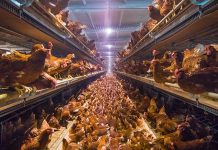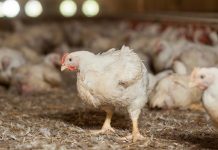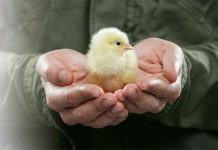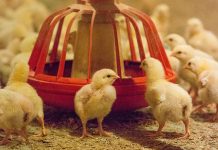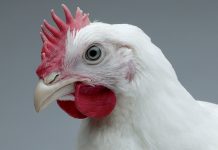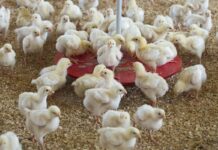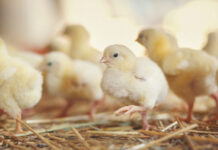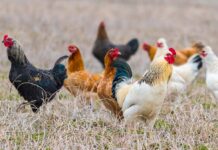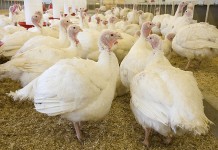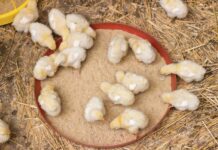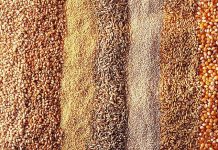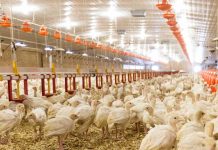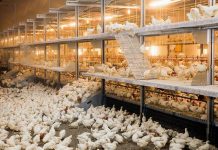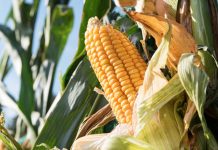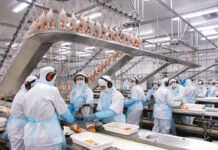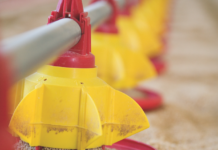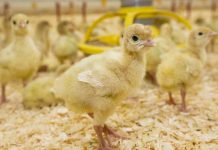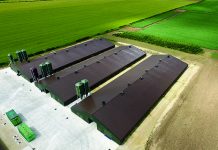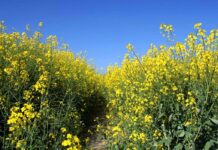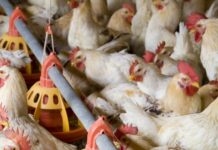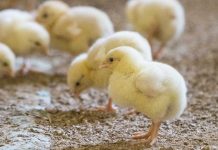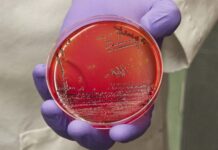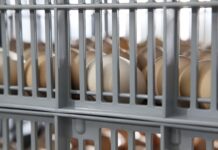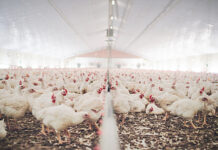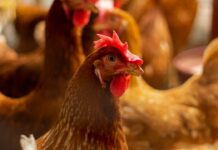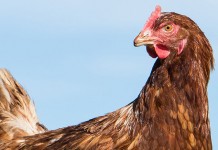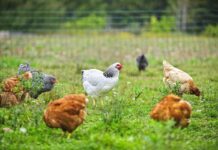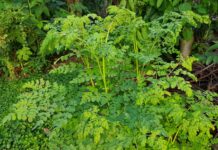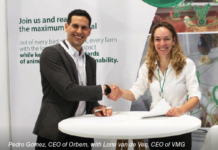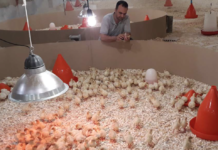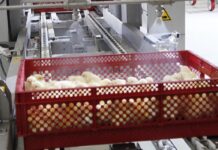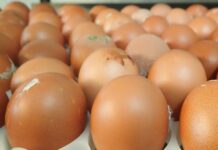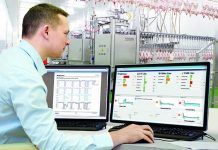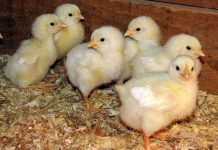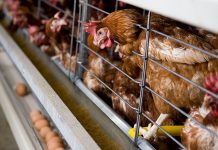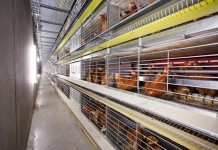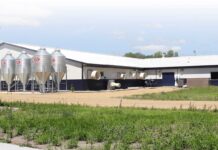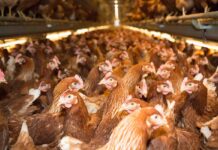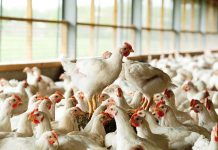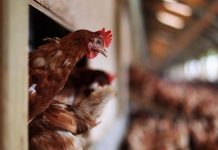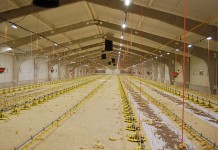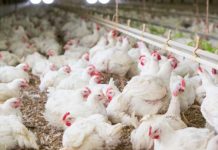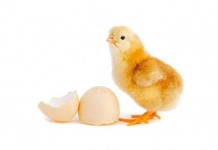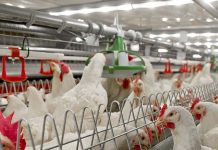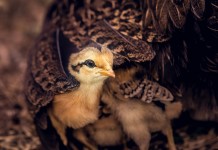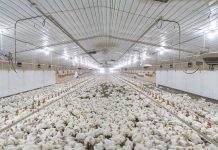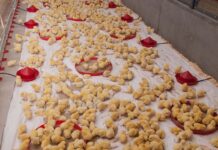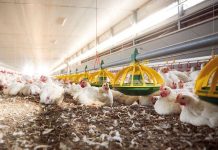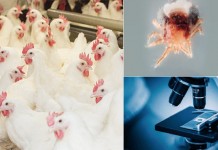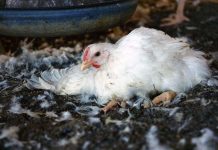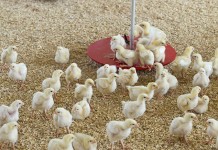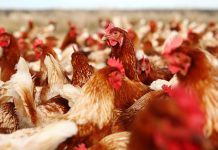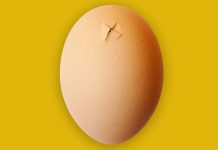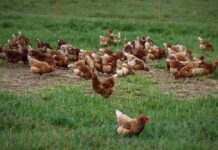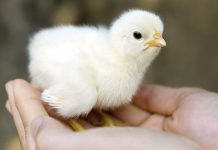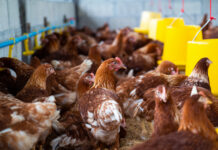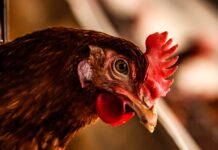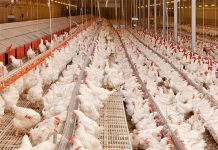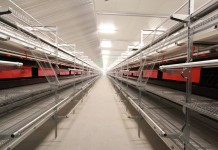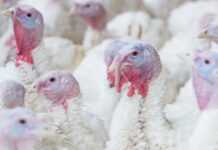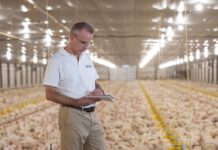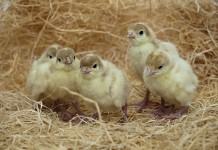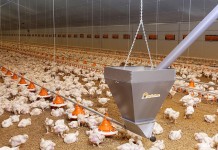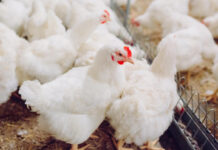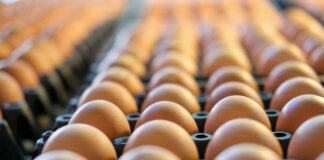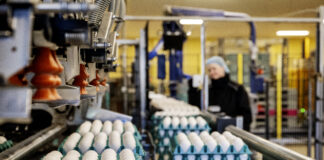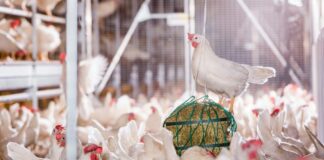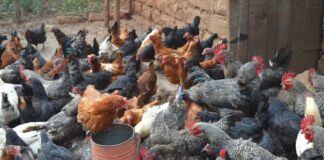Poultry lighting
With LED technologies, farmers can today vary the color, intensity and photoperiod of the poultry lighting in houses and barns to improve production.
While incandescent,...
Foodborne pathogens in poultry production
Foodborne pathogens continue as a considerable threat to public health. Intensification of livestock production, especially poultry, facilitates diseases transmission by increasing population size and...
Timing is everything in early feeding
Early feeding is now a critical point. When using nature as a reference to what are the optimum requirements of the day-old chick, we...
Short chain fatty acids and poultry gut health
Due to customer demands, producers have been asked to change the way they grow production animals, specifically through the removal of antibiotics. With this...
Ileal amino acids digestibility in response to increasing phytase dose or MCP levels in...
Commercial broiler feed is formulated mainly with plant based ingredients including cereals and oil seeds. These ingredients provide low available P because 70-80% of...
Meyn launches the new Opening machine 240 with the patented cutting mechanism
The next generation Meyn Opening machine 240, works with a “Swivel” movement to ensure an exact cut to reduce intestine damage at high speeds,...
Evaluation of a novel slow-growing strain for chicken meat
The slow-growing broiler (SGB) strain offers an alternative chicken meat choice, while appealing to the ‘niche’ market and attracting a premium price. SGBs have...
The manureshed concept: a solution to poultry litter nutrient recycling?
Surface waters in the United States are regularly assessed as a part of the Clean Water Act to determine whether the water quality protects...
Pirbright’s new Avian Influenza vaccine
An improved poultry influenza vaccine has been developed by researchers from The Pirbright Institute. The potential vaccine triggers a rapid immune response which protects...
Resources and tools to write a good biosecurity plan
Poultry
industries in the United States (U.S.) have been in a unique situation after
the 2014-2015 highly pathogenic avian influenza (HPAI) outbreak. Analysis and
epidemiology of the...
Turkey breeding – Where from, Where to? – Domestication of animals was a major...
All species of today’s domestic plants and animals followed an analogous pattern of multi-generational change influenced by humans. The modern populations of turkeys followed...
Avian reovirus, molecular characterization
Avian reovirus (ARV) is the main cause of viral arthritis and tenosynovitis in chickens and turkeys, triggering economic losses in the poultry industry due...
Protein digestive dynamics influence growth performance of broiler chickens
Three apical diets were formulated to stimulate different protein digestion rates dependent on the major constituents: standard (soybean meal), rapid (whey protein) and very...
Can xylanase inhibitors affect the efficacy of xylanases in poultry diets?
Xylanase inhibitors are reported to be widely present in cereals, and can influence the assay of supplemental xylanases in feeds.
In the present study, a...
Pulmonary Nocardiosis in turkey poults
Nocardiosis is an opportunistic, noncontagious, pyogranulomatous or suppurative disease of domestic animals, wildlife and people. In domestic animals, it causes mastitis, pneumonia (granulomatous lesions...
Poultry expertise at IDEXX
In a rapidly evolving poultry production environment with fewer treatment options, disease prevention and identification are more important than ever. Reliable lab diagnostics play...
Comparison of four injection sites for Se bacterin vaccine in commercial pullets
As commercial pullets farming transitions from rearing a bird on a single level in conventional-style housing to rearing a bird in a multi-level aviary,...
Effects of light intensity on broiler welfare, productivity and leg health
Researchers investigated the welfare implications of behavioural changes induced by varying light programs. Here the effects of light intensity on broiler welfare and productivity are reported.
Managing the risk makes the difference in mycotoxin control
A webinar on the results of the 2017 harvest analyses in terms of mycotoxin contamination has been recently held. Two experts on the matter...
Researchers evaluate euthanasia methods for large poultry
USPOULTRY and the USPOULTRY Foundation reported the completion of a funded research project at Auburn University in Auburn, Alabama, in which researchers evaluated four...
EU Compound feed production in 2021 – Market Outlook 2022
Industrial compound feed production in the EU remained stable in 2021. Looking forward, the spread of animal diseases and the continuing global grain market...
Raising turkeys without antibiotics
Alternative management – paying attention to detail and supportive care strategies can be utilized to produce turkeys without antibiotics in this new era.
Dr. Steven...
The bioavailability of zinc in poultry: what does literature say?
Zinc bioavailability: zinc is an essential trace element for all the animals, including broilers. In case of deficiency, alteration of growth performance and distortion...
Phytic acid reduction in canola and camelina meals
Canola and camelina meals have been identified as alternative plant protein sources in place of soybean meal for animal feeding. The use of these...
A rationale for elevated free threonine plasma concentrations in chickens offered reduced-crude protein diets
Pronounced elevations in free threonine plasma concentrations have been consistently observed pursuant to crude protein reductions in broiler diets. However, the magnitude of these...
NRGene to offer the first broad soy diversity & haplotype database
All-by-all full genome comparison of 30+ varieties to rapidly improve nutrition and hardiness and reduce resource requirements
NRGene, the leading genomic big data company, has...
Better hatch and post-hatch performance
Hatchability, chick quality and post-hatch performance improve substantially when embryo-response parameters are actively controlled during incubation. The BioStreamerTM concept, developed by Petersime, continually monitors...
Pathogenesis of egg infections by salmonella – Second Part
Early protection has been demonstrated after primary live vaccine administration early post-hatch but this effect is serotype-specific, while cross-protection between some serotypes has been...
Evaluation of effects of in ovo light stimulation on incubation performance and chick quality...
In sustainable commercial poultry business, hatchability and chick quality are key points that determine the yield and cost of production. Positive results of lighted...
Improving broiler-breeder performance with 25-hydroxyvitamin D3 of fermentative origin
25-hydroxyvitamin D3 from a fermentative source was supplemented to broiler-breeders in two separate trials, compared to standard basal diets without a 25-hydroxyvitamin D3 source....
Balancing production efficiency and welfare
Early poultry selection programs for feed efficiency and production traits alone have been proven successful at developing commercial lines of highly prolific layers and...
Feather-eating hens show specific essential amino acid appetites in a double-choice model
Nutritional balance is one of the major considerations to prevent severe feather pecking in layer hens. Individual variation in digestive and metabolic efficiencies and...
New board research initiative grant focused on animal welfare
$110,000 in funding for a new research grant addressing animal welfare. The topic and request for proposal were selected by the USPOULTRY board of...
The use of moringa oleifera leaf meal (MOLM) and its extract in low protein...
The objective of the present study was to evaluate the effect of incorporating different levels of MOLM and its extract - as natural antioxidants...
Reducing undigested protein available at the intestinal wall on broilers
An experiment was conducted to evaluate the effects of supplementing an inherently thermo stable protease in broilers fed diets based on single raw materials,...
Vencomatic Group and Orbem announce a strategic partnership for in ovo sexing of poultry...
Vencomatic Group (VMG), a family-owned supplier of innovative solutions for the international poultry industry, and Orbem, a leading deep-tech imaging and AI technology company,...
Some common issues of the first week in brooding turkey poults
Turkey poults are very sensitive to environmental conditions and any uncomfortable situation very quickly leads to a problem and even sometimes a disaster. Any...
Big problem – simple solution in the hatchery
A hatchery got in touch with me recently about a worrying problem: 3-5% of the newly delivered chicks were dying during their first 3-5...
Effective fumigation of hatching eggs to improve hatch results
Microbial contamination of hatching eggs is a main concern of hatcheries as it causes decreased hatchability, poor chick quality, growth and performance. It is...
Infectious bursal disease viruses may swap genetic material during infection
Live cell imaging has been used by researchers at The Pirbright Institute to reveal new information about how different strains of infectious bursal disease virus...
Reaching full potential with Innova IMPAQT
A real-time impact on performance, availability and quality
A modern poultry processing plant is a complex network of interconnecting processes operating at high speed. It...
Trouw Nutrition presents research during the Poultry Science Association Meeting
Synergistic use of different feed additives may support producers’ antibiotic reduction programmes.
Reducing antibiotic use in poultry production is an urgent objective shared by stakeholders...
Research shows limited effectiveness for two darkling beetle control products
USPOULTRY and the USPOULTRY Foundation announce the completion of a funded research project at the University of Georgia in Athens, Ga., in which researchers...
Alternative systems from SPECHT
In compliance with all the current national and European legal requirements, Specht has developed three different layers housing systems which are able to meet all poultry farmers’s needs.
Spirulina platensis Algae, a novel poultry feed additive
Identifying alternative replacements for soybean meal in a high quality and reasonable price is of importance in poultry production and physiological parameters. Spirulina platensis...
Back to basics: we need to concentrate on basic management skills
As we move to using less antibiotics in the production of poultry, many alternative products have been developed. While some are affective in specific...
Infectious Coryza in vaccinated layers: are vaccines failing to protect?
During 2017 and 2018 Infectious Coryza was detected in several commercial vaccinated egg layer flocks in California. The Avibacterium paragallinarum strains isolated from infected...
Detection and quantification of Gallibacterium anatis and Mycoplasma synoviae
Mycoplasma synoviae is one of the most common preconditions for secondary bacterial infections in poultry. It causes subclinical infections of the upper respiratory tract,...
Two critical points in the rearing of Hubbard premium pullets
Achieving good uniformity is not the biggest challenge during the rearing period of Hubbard Premium breeder females. Because they take a fairly long time...
Path to the 100 week age layers in cage free systems
Egg producers are always looking for ways to improve layer hen’s efficiency as, nowadays, the genetic potential of layers is targeting an extended age...
Different light sources
The value of regulating the photoperiod of poultry and livestock to stimulate reproduction has been recognized for many years and is used regularly by...
Research examines novel next generation sequencing techniques
USPOULTRY and the USPOULTRY Foundation announce the completion of a funded research project at the University of Georgia in Athens, Georgia, in which researchers...
Hatchery waste management
There are various options for hatchery managers to convert their waste into value-added products such as compost, fertilizer, liming agents for soil amendment, biogas, medical products, and animal feed. This article explores some of these options.
Precision feeding of broiler breeders
Precision livestock feeding relies on real-time sensor feedback from individual birds to decide whether or not to allocate feed, according to the needs of...
Separating welfare facts from fiction
It has become a confusing market for customers to decipher which technologies offer the best welfare-friendly solutions for their animals. How do you separate...
Researchers use laser for broiler house enrichment
USPOULTRY and the USPOULTRY Foundation announce the completion of a funded research project at Iowa State University in Ames, Iowa, in which researchers used...
Coccidiosis control in broiler breeders with the use of vaccines by Aviagen®
Coccidiosis is a disease of the intestinal lining, produced by the invasion of the mucosal cells by a very prolific protozoan parasite of the...
Reducing antibiotic use without harming profitability is an actual possibility
Ten million people are at risk due to antibiotic resistance, ensures the “Antimicrobial Resistance Review” published by the United Kingdom government in 2014. Of...
Characterizing litter mite communities. Applications of DNA barcoding for management strategies
The use of DNA barcoding can facilitate rapid biodiversity assessments of fastidious taxa - litter mite communities - by delineating species using molecular operational...
Transcriptomic modifications caused by subclinical necrotic enteritis in broiler chickens
Phasing out of in-feed antibiotics in the poultry industry has caused necrotic enteritis (NE) to become a primary concern in commercial poultry production in...
Backyard poultry flocks Salmonella spp. seroprevalence
As backyard poultry grows as a hobby in the United States there is an increased worry that poultry will become infected with Salmonella spp....
Review of different day-old chick quality parameters in layer type breeds – Part 2
The aim of every commercial layer hatchery is a maximum hatchability of first quality chicks. The evaluation of chick quality in the hatchery provides...
Chlamydia spp. detected in poultry in Piedmont, Italy
Chlamydia spp. are agents of re-emerging infections in poultry worldwide and deserve attention from a public health perspective due to the well-known zoonotic nature...
Air cell up when setting eggs!
It is important to pay attention to the orientation of the eggs when placing them on setter trays as this has quite an impact...
Drought impacts on plant ground cover on a free range egg farm
In this study drought conditions were experienced and was high-lighted the difficulty for farms in maintaining green ground cover during adverse dry conditions.
Introduction
Maintaining vegetation...
Gaining a better understanding of incubation in a hatchery
The contemporary hatchery is a complex installation. The core part is the incubators, supported by the devices that facilitate their function and auxiliary machines...
Testing the fertility is important to predict hatching success
Measuring the level of fertility of any batch of eggs is a key factor in hatcheries. Fertility testing may be necessary in order to...
Management of ectoparasites in cage-free housing systems
As cage-free systems become more frequent in poultry production, we are forced to evaluate how pest control measures should adapt to ensure efficacy.
The...
Priming young birds for gut health and resilience
This brief review focuses on the types of fibre that the nutritionist should be considering and how a phase feeding strategy should not only...
Sea urchin waste as alternative source of calcium for laying hens
In Italy, several tons of sea urchins are harvested annually, yet only the gonads are used for consumption; the rest, rich in calcium carbonate,...
Salmonella control in broiler breeders
Today, our goal is to control and eliminate all Salmonella species and pathogens from the breeding program. The ability of the primary breeder to...
Jansen Poultry Equipment: the perfect solution for cage-free egg production
Consumers demand for cage-free egg production is growing worldwide. Europe already adopted cage free egg production systems and it seems that the US is following rapidly starting with Oregon, Washington. Also in New Zealand and Australia animal welfare is a main topic of discussion.
A new poultry research center at the University of Bristol
A state-of-the art poultry research centre offering specialist, industry-focused research into both laying hen and broiler health, welfare, behavior and productivity has recently been...
Concurrent infection of Histomonas meleagridis and Eimeria meleagridis in a turkey flock
Blackhead disease (histomoniasis) in turkeys is one of the protozoan diseases sporadically documented in commercial turkey production facilities. Histomoniasis may induce mild, moderate, or...
Response of broilers fed phytase enzymes of different optimal pH ranges alone or in...
Dr. Kelley Wamsley and colleagues at the Mississippi State University Poultry Science Department recently completed a research project that investigated how broilers respond when...
Fear in turkeys, implications for productivity and wellbeing
From an evolutionary standpoint, fear is an adaptive response that promotes survival by enabling animals to avoid injury and death. Because of the important impact that fear has on animal well-being, fear has formed the basis of many scientific studies and is included as part of welfare assessment programs such as the Welfare Quality Assessment Protocol for poultry.
Testing day-old poults
When poults are received at a farm from the hatchery they should be good quality poults; namely, free from physical defects, actively looking for...
Bacillus Subtilis improves performance of broilers fed medicated or non-medicated feed
Animal digestive health is key to obtain optimal performance. Antibiotic growth promoters (AGPs) have long been shown to be very effective to develop and...
Quality Control Audits of killed vaccination
Vaccination programs for breeders and egg layers include procedures with inactivated vaccines. Killed (inactivated) vaccines are used to prevent disease in the vaccinated bird...
The effect of monochromatic photo-stimulation on growth and reproduction of broiler birds
Broilers in-ovo or with post hatch photo-stimulation with green light (GL) were heavier from dark incubated birds. Furthermore, we defined the cellular and molecular...


